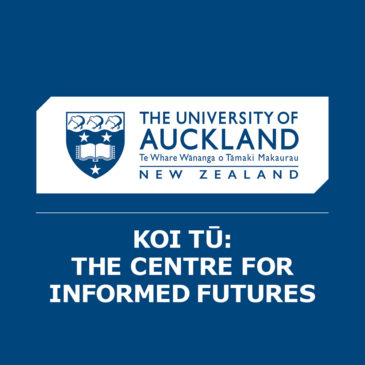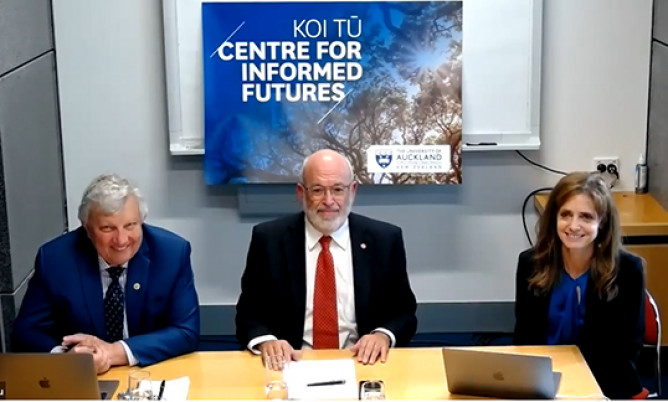Koi Tū tackles long-term national and global issues

In this section for submissions by our Fellows, Sir Peter Gluckman FRSNZ introduces Koi Tū: The Centre for Informed Futures - a research centre focused on addressing issues and initiating conversations about our future.
Koi Tū: The Centre for Informed Futures was opened by the Governor General earlier this year. It is an apolitical thinktank and research centre hosted by the University of Auckland, but with membership across other New Zealand universities and international institutions. Sir Peter Gluckman FRS FRSNZ has been appointed as its initial director. The rationale for its establishment lay in the relative dearth of long-term thinking in the New Zealand policy space. The Centre’s work is focused on addressing long-term global and national issues arising from rapid and far-reaching social, economic, technological and environmental change.
Even without the added burden of Covid-19, we face an unprecedented time in human history. The negative impact of humans on the planet has become undeniable. Pervasive and disruptive technologies impact on every aspect of the human condition and our institutions; the ways we relate to each other are fundamentally changed by the digital world; misinformation and disinformation confuse; demographic change is profound; lifestyles and expectations have changed; mental health issues are rising, especially for young people; and psychological resilience is challenged.
Societies face tough questions. The right solutions require us to transcend partisan politics and the political cycle. We need to find ways to genuinely engage citizens because the current methods of community consultation are not truly representative. Trust surveys indicate that citizens across the Western world have declining faith in governments to solve their problems. We may be less affected than most, but we cannot be complacent.
The creation of Koi Tū: The Centre for Informed Futures, earlier this year aims to help address some of the tough questions. We are a novel enterprise for a New Zealand university – an independent, apolitical think tank focused on challenges of national and global concern.
There is a crucial role for academia in this to explore societal and individual resilience in the face of rapid change; developing integrated knowledge for decision making by communities and policy makers in a post-truth world; understanding impacts of rapidly emerging technologies; and identifying the trade-offs embedded within the sustainability agenda.
Operating at the nexus of academia, civil society and public policy, and between national and international discourses, we are uniquely placed to explore these issues. We want to better connect knowledge produced in academia with true engagement with society, integrate their perspectives and assist societal decisions and the policy community in a relevant way.
Koi Tū is to exploring the long-term implications for New Zealand from Covid-19. We are producing a series of discussion papers called Koi Tū: The Future is Now Conversation Series based on conversations with academic and industry leaders.
The first – The Future is Now: Implications for New Zealand from Covid-19 focuses on the challenges and opportunities posed by this hugely disruptive crisis, and how New Zealand’s future can be shaped in an informed and inclusive way.
The second He Oranga Hou: Social Cohesion in a post-Covid world examines the critical issue of how New Zealand’s strong national unity during lockdown will become increasingly tested as economic consequences hit home.
Other papers including mental health, the future of food, the geostrategic implications for New Zealand’s place in the world, and the green economy are also underway.
The centre was born out of a realisation that it has never been more important for community and local, national and global policy decisions to be informed by evidence, and that society is searching for information it can trust.
Unfortunately, we live in a world where the contest of ideas is increasingly taking place in an unhealthy environment of misinformation and, in many places, declining public trust in democratic, scientific and societal institutions.
Social, economic, technological and environmental transformations are happening around us at a scale and speed which is unique in human history. As scientists, we have a crucial role to play in ensuring our rangatahi’s future is in the hands of decision makers armed with robust evidence.
Our initial areas of focus are: How do we counter misinformation and develop better understanding about who and what can be trusted? How can we improve trust in societal institutions? What does effective consultation and engagement really mean? What puts social cohesion at risk? What will lead to greater societal resilience in a time of rapid change across multiple dimensions of our existence? The Centre already leads a global project addressing these questions. In doing so, it explores how we can ensure that individuals become more resilient, as they deal with the challenges of rapid change, existential threats and technological innovation. A particular question is how are we, as individuals and as a collective, adjusting to a virtual world where technologies are emerging at a rapid rate? How can societies make decisions about our relationships with technology and regulation of fast-emerging and pervasive technologies generally? The Centre has worked with many international agencies on issues related to the UN Sustainable Development Goals. The inherent complexities point to a need for tools to better evaluate the kind of trade-offs we need to make in order to live sustainably.
As a small advanced country, New Zealand can be both the “canary in the mine” to identify issues that are emerging and “the headlights to identify the road ahead.”
Koi Tū will focus on how to help communities and governments better understand complex issues and acknowledge inevitable trade-offs and values, in ways that lead to robust, societally-accepted decisions. It offers researchers and thought leaders a way to engage with the community and inform the policy discussion, while also offering a pathway to policymakers to find the right advice.
We are also developing “complex conversations” tools to assist traditionally disempowered groups, as well as other stakeholders including the business community, to better participate in policy development.
Through these processes the centre aims to become a recognised neutral space to initiate conversations that catalyse broader processes and decision making. We do this by combining the scientific disciplines, both natural and social, to provide collaborative advice that can help policy makers and civil society better understand the issues.
Staff at Koi Tū have expertise in the physical sciences, humanities, law, engineering, computer science, social science, economics, health sciences, policy and Mātauranga Māori.
Our uniquely skilled team includes members of the University of Auckland, academics and policy practitioners from around New Zealand and the world. Koi Tū brings together leading and emerging scholars and students across a broad range of natural and social sciences, knowledge brokers and practitioners at the society and policy interfaces, and broader institutions of New Zealand society including Māori, Pasifika and other communities.
The centre also has extensive domestic and international partnerships with both science and policy communities and is home to the secretariat of the International Network for Government Science Advice (INGSA) – a growing global network with more than 5000 members in 100 countries.
We are grateful to Ngāti Whātua Ōrākei for gifting us our Māori name. Koi Tū describes the intent of the centre. Koi is to be bright; to be clever; it is the sharp point of the arrow. The centre is koi by integrating the various knowledge disciplines and to inform people through true engagement and a holistic approach. The centre places itself at the sharp end of long-term issues of complexity such as societal resilience and social cohesion, sustainability, human capital development and societal decision-making regarding emergent technologies. Tū means to stand, to set in place and infers resilience.
The centre is future focused, addressing areas of concern to Aotearoa New Zealand, small advanced countries and globally. It is committed to making a stand; to inform societal and policy decisions over the mid to long term.
About the author
Distinguished Professor Sir Peter Gluckman is the Director of Koi Tu: The Centre for Informed Futures. He was the first Chief Science Advisor to the Prime Minister of New Zealand. He is the chair of the International Network for Government Science Advice and the President-Elect of the International Science Council.
If Fellows would like to respond or comment on the topics in the Fellows' Forum newsletter discussion section, please email the academy and your letter will be included in the next newsletter.

